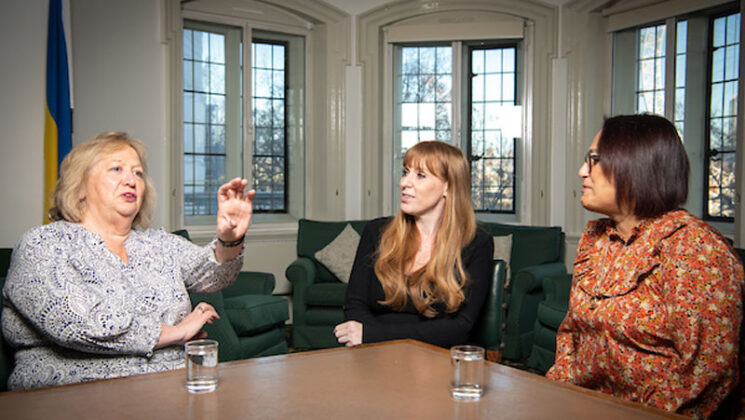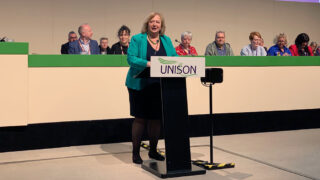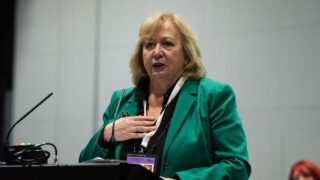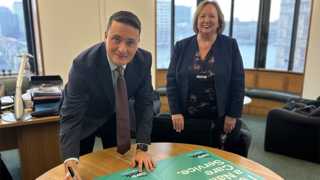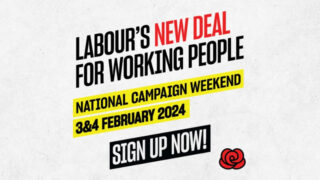It’s a cold, sunny afternoon in Westminster. Angela Rayner MP, deputy leader of the Labour Party, Christina McAnea, general secretary of UNISON and Manjula Kumari, the NEC Black female representative, sit down in Angela’s office over a cup of tea. Their task: to discuss what kind of future they want for the UK’s public services, its workforce, and for society in general – and how to achieve it. The room is already filled with passion and energy and a certain amount of anger.
Angela: Under the Conservatives, the last 13 years have felt like managed decline. And, certainly, the last three years have felt like pure chaos, without any management.
Austerity was such a poor decision. They chose to cut public services and, as they saw it, inefficiencies. Now we are seeing the impact of those cuts on all sectors – with some more disproportionately impacted than others. Services were not only cut, but so was the resilience that we had in the system, that little bit of flexibility that enabled people to go on training or respond to needs at a particular time was no longer there.
So our public services are now running on fight or flight mode. There have been a couple of ‘shocks’ – the global pandemic, the war in Ukraine, the disastrous Liz Truss budget. But we are at breaking point because there is no give in the system, for any kind of crisis.
All credit to our public sector workers who have carried on and carried on. But they can’t keep carrying on. Working in our public services must be so demoralising – whether a home carer on the front line, working in a hospital as a porter, cleaner or a nurse, a health care assistant – not just rushing around trying to plug holes in the system, but unable to deliver what you are expected to deliver and what you want to deliver.
Manjula: It is demoralising, because we care about what we do. I work in adult social care on the front line, I work with adults with disabilities. In the last 20 years, we have moved from a position where everything was insourced – social workers, carers, with proper training and support on proper wages – to a position where everything has been outsourced. But we are not just at crisis, we are broken.
What is so sad for social care staff is that they are saying, ‘I don’t have the energy left to do it now. I’m playing constant catch up, I don’t know how to get from A to B.’ We end up being councillors to the very staff we work with.
I don’t want people to just float – I want people to be able to swim
Angela: We have got to give people hope and tangible solutions to how we can make things better. We’ve said in the Labour Party that we can’t fix everything overnight. But there are things that we have set out that will change people’s lives for the better. Like the New Deal for Working People, which has a huge amount in it that will change the face of work.
Part of that is about collective bargaining and part is about empowering unions. We have to end insecure work. We want to end fire and rehire. We want proper pay agreements, proper collective bargaining, proper maternity pay, to make sure that people feel supported at work.
But it is bigger than that. I don’t want people to just float – I want people to be able to swim. We should have good public spaces, we should have good social housing, we should have good, secure jobs for people. This should be the Kitemark of what Britain is about, what we want to deliver for our children for the future. It is not unattainable. Our country created a welfare state, we created social housing, we created a national health service.
The Procurement Bill which is going through Parliament, now it has our ideas, will see the biggest amount of insourcing for a generation. We need a public health strategy that is preventative, that is a wellbeing strategy. I want to see the economy grow on a wellbeing strategy, I want to see how happy the nation is, how well are our children doing. Why do we only measure if children are in dire poverty? My aspiration is not to just lift them out of poverty but to ensure every child has opportunities to go to the theatre, go to university, that they have access to arts and culture.
I don’t accept that Britain, which is one of the richest countries in the world, can allow millions of pensioners to live in poverty, and millions of children in poverty, with the majority of workers struggling to get by when they are in work.
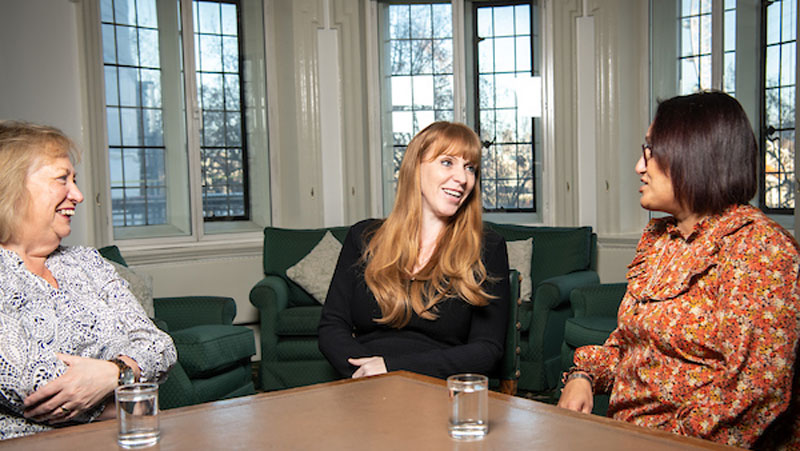
Christina: The impact that 12 years of managed decline has had on so many people in our society cannot be underestimated. At the same time, really rich people have just got richer. I think the government has focussed not on how you run the country but on helping their mates, and making everyone else pay for that. My vision is a Labour government in Westminster which will commit to a different strategy.
UNISON is a public sector union. I want to see more money in public services, staff who have access to decent pay, terms, and conditions. But I totally recognise that you need a flourishing economy to do that. Running down the public sector and the services it provides does not achieve that. And this has never been about private versus public, because we also need a flourishing private sector.
We need investment in this country, we need foreign investment as well as our own investment, and we need an economic strategy that delivers some of that. If you give public sector workers a decent pay increase, decent money to live on, they spend it in their local communities – they help generate and drive the economy. We need a Labour government that has a consistent approach to investment, raising the economy, investing in public services, and recognising the contribution that public services make to the rest of the economy.
Big corporations do need to start paying their fair share in terms of taxation. They too depend on our public services; if a massive delivery company warehouse goes up in flames, they ring 999 and the fire service comes out; somebody collapses at work, they phone 999 and an ambulance turns up; their staff drive to work on roads and public transport; their kids go to the local schools – their workers could not do their jobs unless they had good public services. The best part of the private sector recognises that, but we need a government that recognises that too.
Angela: How can the Conservative government justify lifting the ban on bankers’ bonuses at the same time as telling ambulance staff that they have got to take another real term pay cut – after a period of 12 years of public sector pay restraint? It is not acceptable that home carers decide to take a job in a supermarket because it means less stress and more money.
Christina: We need a concentrated effort to actually end low pay in this country. You mentioned supermarkets – Sainsbury’s have recently set a minimum rate of £11 per hour – the minimum rate in the NHS is £10.37 per hour. No wonder people leave. The vast majority of people who work in the care sector are on national minimum wage [£9.50 per hour]. Why would you stay and do a really difficult and stressful job like that, when you could go and work in a supermarket? It is not easy to work in a supermarket, but it is probably not as stressful as working in a care home.
So that commitment to ending low pay is something that we would push the Labour Party to do. We will push for £15 per hour minimum wage. And I know that sounds like a big jump, but actually when you look at what’s happening in society right now, and you look at what’s happening to inflation, that is not unreasonable.
It is about being aspirational. It is about money, but it is also about changing the culture and giving people opportunities in life
Angela: We are paying significant sums to fund agency staff and we have thousands of job vacancies. People are not receiving care because there are no staff. Vast sums of money are being spent, but in the wrong place. If we eliminated low pay, money would come back into the system in the right places.
Christina: The other thing we are committed to is that the Low Pay Commission needs to reset and actually take account of cost of living prices. Inflation is 12% but the cost of food, on which low-paid workers spend more than 50% of their income, has risen by 17% – people are paying half of their pay just to feed their family. It’s a huge impact on them.
Angela: Rachel [Reeves, shadow chancellor] and I have come up with a formula around the Low Pay Commission, that we would be locked into, that takes into account cost of living and is more sustainable going forward,
Manjula: If people were paid the right wage, there would be no need to use agencies and staff would be paid the right wage. There would be no need to give them gas top ups, electricity top ups. Money would go to people to have the quality of life that they want to have, not what they are being told they can have. Why shouldn’t people have the real living wage, a wage for the here and now. Wages should be under constant review. Just pay the right wage for what the job is worth and you will have happier staff, happier workers and a happier public.
Christina: It is about being aspirational. It is about money, but it is also about changing the culture and giving people opportunities in life. When I was young, we had no money and I knew things would be difficult, but I could go to university, I could do things. But I think social mobility is worse now than it was when I was young. And that is shocking.
Manjula: Looking at the future for our young people and the next generation, we need Sure Start centres to be brought back, so we can empower our younger families to say ‘I can go out and I can retrain’, ‘I can go out and apply for a job’. Many shelters for domestic violence survivors have closed – we need to enable our young mums, our young dads who are in those situations to know that they have a safe place to go to. I want those to be brought back.
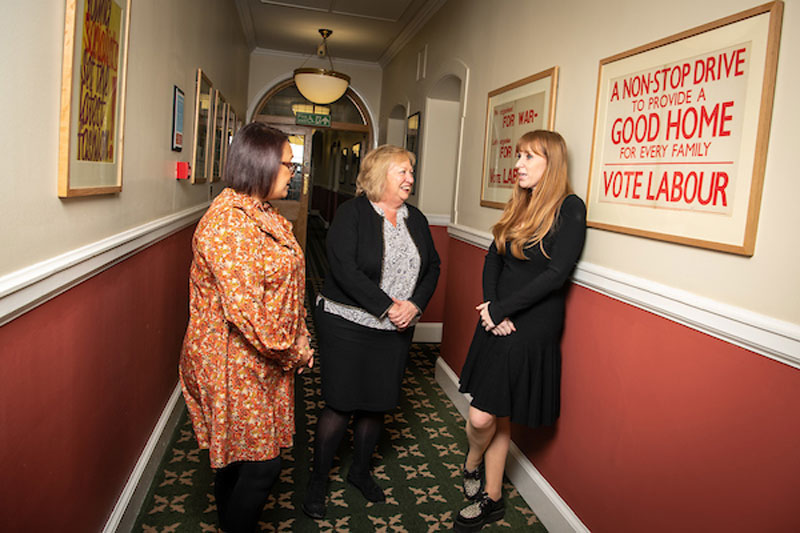
Christina: If you think about what you want the world to be in the future, it is about the culture that you generate in a society. I hate the fact we have a government that talks about deporting people to Rwanda, that talks about refugees almost as if they are inhuman. I hate the fact that during the pandemic, you could see who was most impacted – it was Black workers and Black people in society, it was low-paid workers, it was disabled people who were worst affected and the government did nothing about it. They don’t see the interconnectivity between their policies and the impact it has on peoples’ lives. I want my children and future generations to live in a country that is compassionate.
People talk about the UK being a crowded nation – we are not. There are certain hubs, metropolitan areas that have quite a lot of people and so need the infrastructure to support those areas, but we are not a crowded nation. We are a nation that has always sent people abroad to work and do things; and at different times we have welcomed people into this country.
And that is what we want, that welcoming, open culture, where people can speak up on things and are not ridiculed, are not dismissed as politically correct. These things matter.
Angela: I think it is part of this government’s strategy – a deliberate ‘it’s not us, it’s them. It is the people on benefits, it is the people arriving on small boats that are causing the problems in your life.’ It’s not true. The problems that we are facing in this country are predominately due to decisions that this government has made. And actually our country has always been a compassionate country, we have always been internationalist.
Christina: We need to reclaim those values.
Angela: I have a better aspiration for this country, I absolutely believe we can change things. The best way of doing that is collectively. It might be the public and private sector together, it might be us as a society coming together, not fighting and blaming each other. We want to work with those who want to create a better society – with businesses, the public sector, the private sector, with individuals. Let’s come together and do something great. Let’s give our next generation something they can be proud of.
Christina: That’s why this demonisation of the unions and the workers needs to end, the way this government talk about the public as though the 1.3 members in UNISON are not public. Almost everyone knows somebody who works in the public sector.
My vision for the future is to have a government that is prepared to work with the unions, a government that recognises that unions represent workers who do a really important job, and if they want to reform a service, they sit down with the unions and talk about it.
Who has the expertise? Not me as general secretary. But we have members who have that expertise, who could say, ‘That would work, or that wouldn’t work, and here are the reasons why…’ That’s my vision for the future.
Christina, Manjula and Angela were speaking with Nicki Burston. Images by Steve Forrest.

